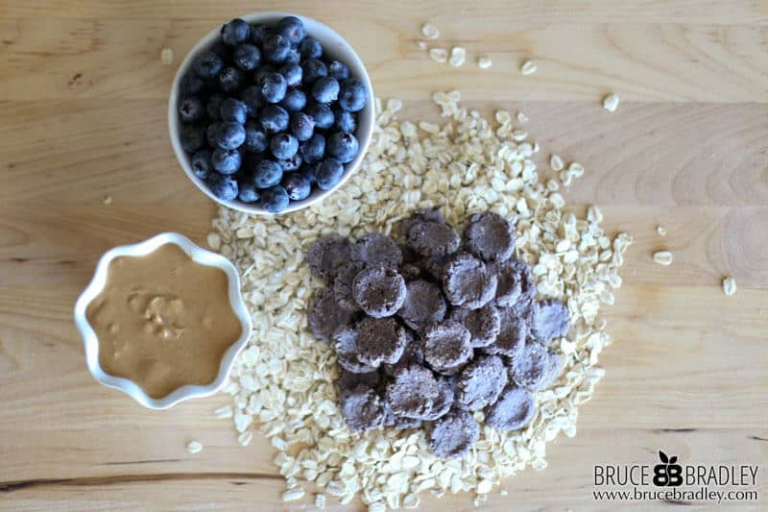Can Dogs Eat Blueberries, Or Will This Fruit Give Your Pup The Blues?
There are lots of fruits and vegetables that are safe for dogs to eat, but few are as healthy, recommended by vets and canine nutrition experts, or beloved by dogs as the humble blueberry. The perfectly sized healthy treat, blueberries are safe for dogs and good for them, too!
Sometimes called a “superfood” thanks to their high concentration of vitamins and minerals, blueberries are one of the best fruits to add to your dog’s diet. Thankfully, most dogs love these tiny juicy berries, and you won’t have to do much convincing to get them to enjoy this tasty treat.

Of course, you shouldn’t start feeding your dog handfuls of blueberries daily. You’ll need a little more information before introducing your pup to this food. For example, can dogs eat blueberries raw, or should you cook them first? How many blueberries can a dog safely eat? How can you tell if your dog is allergic to blueberries?
Here, you’ll learn everything there is to know about how to feed your dog blueberries in every form, including recipes so you can make blueberry dog treats at home!
Are Blueberries Good For Dogs? Health & Nutritional Benefits
Yes, blueberries are good for dogs! Blueberries are a super-healthy treat for dogs and are high in fiber, antioxidants, and other key nutrients. Blueberries are so good for dogs that many dog food and dog treat brands include them in their recipes. Here are a few of the nutrients found in blueberries and how they can help your furry friends stay happy and healthy.
| Blueberry Nutrition Facts | |
| Nutrient | Benefits for Dogs |
| Dietary Fiber | Helps support a healthy digestive system and nutrient absorption. |
| Iron | Supports oxygenation and cellular energy production. |
| Manganese | Helps to support healthy energy levels and metabolism. |
| Vitamin A | Supports immune health, bone strength, vision, etc. |
| Vitamin C | Vitamin C is an antioxidant that protects against free radicals and supports immune function. |
| Vitamin K | Supports bone and muscle strength, immunity, cardiovascular health, and metabolic systems. |
How Many Blueberries Can a Dog Eat?

With so many healthy nutrients available to your dog, you might think you can never go wrong with feeding them blueberries. While it’s true that your dog can benefit from enjoying a few blueberries in their diet, this fruit also has a high sugar content that could affect your dog’s health.
Even higher in sugar than strawberries, blackberries, raspberries, and almost every other berry variety, blueberries might be a superfood, but they’re super-sugary, too! In large quantities, blueberries can upset your dog’s stomach and create health problems. Some dogs may even experience changes in blood sugar levels if they consume too many of these fruits. If your dog eats large amounts of blueberries regularly, they could even experience dental issues like cavities.
To protect your dog’s health, we recommend feeding your dog no more than 5–10 blueberries per day.
Can Dogs Be Allergic To Blueberries?
Yes, dogs can be allergic to blueberries. Allergic reactions in dogs to foods can present in a variety of ways. The first signs are usually excessive itching, paw licking, or hotspots, but some dogs will show signs of gastrointestinal upset and may have bouts of vomiting or diarrhea.
If you have never fed your dog a blueberry before start with just one and monitor your pup for any signs of an allergic reaction. While serious allergic reactions are rare, you should call your vet if symptoms persist or worsen.
Can Dogs Eat Wild Blueberries?

Yes—but with caution! Wild blueberries are safe for dogs to eat, but you should be cautious of letting your dog eat foraged or wild foods.
Even experienced foragers take extra precautions to ensure they are 110% certain of their identifications since a mistake can be deadly. While wild blueberries are considered an easy berry to identify, there are look-alikes—both edible and toxic.
For this reason, we don’t recommend feeding your dog wild blueberries you’ve foraged yourself unless you have the assistance of a seasoned professional.
Toxic Blueberry Look-Alikes
In North America, there are a handful of toxic berries that could be mistaken for blueberries by inexperienced foragers. While some inedible fruits only cause mild stomach issues, others contain such high concentrations of toxins that they can cause serious health issues and even be deadly to you and your dog. The fun of foraging can be completely ruined by misidentification, so we suggest using your eyes to enjoy the signs of nature rather than sampling off the bush. Some examples of toxic blueberry look-alikes found in North America include…
| Toxic & Dangerous Blueberry Look-Alikes | |||
| Species | Risk To Dogs | Toxins | Symptoms of Toxicity in Dogs |
| HIGH | – Atropine- Hyoscyamine- Scopolamine | – Excessive drooling- Vomiting- Diarrhea- Lethargy or drowsiness- Weakness- Disinterest in food- Dilated pupils- Sudden behavioral changes/confusion and disorientation- Tremors or convulsions- Reduced respiration or cardiac activity- Paralysis- Death | |
| HIGH | – Dauricine | – Vomiting- Diarrhea- GI Upset- Disinterest in food- Lethargy- Rapid or irregular heartbeat- Seizures- Liver damage- Death | |
| Low | – Glycoside | – Vomiting- Diarrhea- Loss of interest in food- Lethargy | |
| HIGH | – Oxalic acid- Phytolaccatoxin | – Excessive drooling- Vomiting- Diarrhea- Disinterest in food- Tremors or convulsions- Sudden drops in blood pressure- Death | |
| Medium | – Oxalic acid | – GI upset- Vomiting- Diarrhea- Dilated pupils- Excessive drooling- Difficulty swallowing- Swollen lips, tongue, and airway- Disinterest in food- Difficulty breathing- Heart arrhythmia | |
How To Feed Blueberries To Your Dog: Recipes & Serving Suggestions
The easiest way to feed blueberries to your dog is by giving them a few raw or frozen on top of their food or as a snack. Dogs love to munch on these sweet, juicy berries, and it’s rare to meet a pup who will turn down a fresh blueberry. However, there are other ways to feed blueberries to your dog—for example, you can use them as an ingredient in homemade dog treats!
Here, we’ve compiled some of our favorite blueberry dog treat recipes—each one is made with 100% dog-safe ingredients your dog is guaranteed to love.
1. Peanut Butter & Blueberry Dog Treats

| Prep Time | 10 minutes |
| Bake Time | 30 minutes |
| Yield | 250 tiny treats |
Perfect training treats or tasty morsels for small dogs and puppies, these peanut butter and blueberry bites contain just five ingredients and come together in just under an hour. Created by Bruce Bradley, this recipe is also gluten-free and safe for pups with wheat allergies.
Ingredients
- 6 cups rolled oats
- 1 cup fresh blueberries
- 2 large eggs
- ½ cup applesauce (sugar-free, 100% apple, no spices)
- 6 heaping TBSP peanut butter (xylitol-free)
Instructions
- Preheat your oven to 350℉ and prepare two cookie sheets by greasing them lightly with butter or olive oil.
- In the bowl of a food processor, pulse the rolled oats for about 20 seconds.
- Add the blueberries, eggs, applesauce, and peanut butter and process until completely blended—you will have a thick, purple-hued dough.
- Shape the dough into small logs, then break off ½-inch pieces and roll balls. Place each tiny treat on your prepared cookie sheets and use your thumb to flatten them, creating thumbprint cookies.
- Bake the treats for 25-30 minutes or until the treats are slightly brown on the edges. Cool completely before serving.
- Store in an airtight container for up to 3 weeks in the fridge.
2. Easy Blueberry Dog Biscuits

| Prep Time | 10 minutes |
| Bake Time | 25 minutes |
| Yield | (62) 2-inch treats |
Dogs that like to chew love crunchy cookies, and we know these homemade blueberry biscuits will delight your furry friends. Developed by Pook’s Pantry, this recipe contains omega-3 and 6-rich flax seeds, fibrous oats, and antioxidant-rich blueberries to support your dog’s health while they snack.
Ingredients
- 1 cup old-fashioned oats
- 1 ½ cups all-purpose flour
- 1 TBSP ground flax seed
- 2 TBSP coconut oil, melted and cooled
- ½ cup water
- ½ cup fresh blueberries
Instructions
- Preheat your oven to 350℉ and prepare two cookie sheets by lining them with parchment paper.
- In the bowl of a food processor, pulse oats until it is powdery but not quite flour.
- Add the all-purpose flour and ground flax seeds to the oats and pulse to combine.
- Add the melted coconut oil and water, then pulse 10–15 times until just combined.
- Add the blueberries, and let the food processor run until a dough forms and begins to ball, pulling away from the sides of the food processor.
- Lightly flour a work surface and dump out the dough. Using a rolling pin, roll out the dough into a ⅛-inch thick sheet.
- Use a 2-inch cookie cutter to cut out biscuits, re-rolling the dough as necessary. Place each biscuit on the prepared cookie sheet.
- Bake the biscuits for 20–25 minutes or until the treats are lightly browned. Cool completely before serving.
- Store in an air-tight container in the fridge for up to 10 days, or in the freezer for up to 3 months.
3. 2-Ingredient Frozen Blueberry Dog Treats

| Prep Time | 10 minutes |
| Freezing Time | 3–5 hours |
| Yield | 10 pupsicles |
Whether you’re looking for a way to cool your dog off in hot weather, or your pooch really likes frozen treats, these blueberry and yogurt pupsicles are the perfect thing! Created by Dorothy Kern from Crazy for Crust, this recipe contains just two dog-friendly ingredients and requires zero baking skills!
Ingredients
- ¾ cup fresh blueberries
- 6 TBSP plain Greek yogurt
Instructions
- Prepare your silicone ice cube tray by placing it on a flat surface, or a plate for easy transfer to the freezer.
- Spoon a small amount of yogurt into each mold, flattening it to create an even layer.
- Freeze the yogurt in the mold for about 20 minutes.
- While the yogurt freezes, add the blueberries to a blender or food processor and blend until you have a smooth puree.
- Remove the mold from the freezer and fill the remaining space in each section with the blueberry puree.
- Return the mold to the freezer and freeze an additional 2-4 hours, or until frozen solid.
- Store in an airtight container in the freezer for up to 2 months.
Can Dogs Eat Blueberries? FAQ

Do you have more questions about what types of blueberries you can feed your dog? Did your dog get a hold of some human foods that contain blueberries and you need to know if you should be worried? Here are the answers to the internet’s most pressing questions about whether dogs can eat blueberries or not.
Can dogs eat frozen blueberries?
Yes! Frozen blueberries are a fun way to cool your dog off on a hot day or give them as a treat with an interesting texture for some additional sensory stimulation.
Can dogs eat dried blueberries?
Yes, in very limited quantities. Dried fruits have higher levels of sugar than fresh fruits, and should not be a regular treat for your dog. Dehydrated blueberries are slightly lower in sugar, but we still recommend fresh raw, or frozen blueberries first.
Can you feed your dog blueberry jam?
No! Blueberry jam is made with huge amounts of added sugar that will upset your dog’s stomach. If your dog ate a little bit of blueberry jam one time, they will be totally fine but don’t share this spread with your dog on purpose.
Can dogs eat blueberry yogurt?
Yes, but also no. Dogs can eat plain, unsweetened yogurt with fresh or frozen blueberries, but they shouldn’t eat pre-made blueberry yogurt. Flavored yogurts usually contain added sugar, flavorings, and preservatives that aren’t good for your dog’s health.
Can dogs eat blueberry bagels?
No. We don’t recommend sharing carb-heavy human foods like bagels with your dog. If they have a small piece they shouldn’t experience any issues, but blueberry bagels aren’t a dog-approved treat.
Can dogs eat blueberry pancakes?
No! Human foods like pancakes are too sugary and high in carbs to be good for your dog, and you should keep items like this for yourself instead of sharing them with your pooch.
Can dogs eat blueberry waffles?
No! The sugar and carbohydrate-heavy ingredients in blueberry waffles aren’t good for your dog.
Can dogs eat blueberry muffins?
No! Muffins are high in added sugar and aren’t a safe treat for your dog unless they have specifically been made with dog-safe ingredients.
Can dogs eat blueberry pie?
No! Blueberry pie is high in sugar and butter, and will most certainly upset your dog’s stomach.
Can dogs eat blueberry donuts?
No! Blueberry donuts are not a dog-safe food and are high in sugar, fat, and carbs that will upset your dog’s stomach.
Related Posts:
- Can DOGS Eat Apples? Here’s How to Safely Feed Them + Recipes
- Can Dogs Eat Pineapple? Unleashing the Juicy Truth Behind This Fruity Snack
- Can Dogs Eat Oranges? This Mystery Is Ripe for Unpeeling




